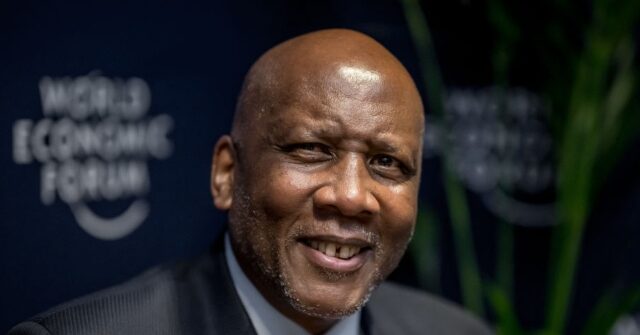The highest percentage tariff on the list of those released by the White House on Wednesday, intended to help balance America’s trade with the world, was imposed on the small African nation of Lesotho.
Lesotho, whose map is completely surrounded by South Africa, has emerged repeatedly as an example for the Trump administration of a nation disproportionately receiving American largess. Trump mentioned the country during his address to a joint session of Congress in early March, describing it as a country that “no one has ever heard of” but nonetheless received millions in American taxpayers’ dollars for a program related to the LGBTQIA2+ community. Officials from the country described themselves as offended by the remarks but nonetheless invited President Trump to visit.
President Trump announced a 50-percent tariff on goods entering the United States from Lesotho on Wednesday, part of a much larger set of tariffs on a host of countries that regularly trade with America. Trump declared Wednesday “Liberation Day” for the U.S. economy, targeting countries that have what he considers unfair trade rules harming American manufacturers and producers. Each country on the list began with a “floor” ten-percent increase in tariffs. From there, according to the Office of the United States Trade Representative (USTR), the office used a formula to calculate what percentage tariffs to impose. The office divided each country’s surplus with the United States by its total exports to the country, then halved that number.
“While individually computing the trade deficit effects of tens of thousands of tariff, regulatory, tax, and other policies in each country is complex, if not impossible,” the USTR office explained, “their combined effects can be proxied by computing the tariff level consistent with driving bilateral trade deficits to zero.”
By this metric, nations with significant trade surpluses with America were subject to the highest tariffs. Lesotho, which imports very little from the United States but exports clothing and diamonds, was calculated to have the equivalent of a 99-percent tariff imposed on American goods.
As a result, Lesotho will now pay America a 50-percent tariff on its goods. One other territory, the French territory of Saint Pierre and Miquelon, will also pay 50 percent in tariffs, the highest percentage on the list. Other African countries faced similar tariffs. Madagascar, which was calculated to impose the equivalent of a 93-percent tariff on American goods, will pay a 47 percent tariff, which prompted online jokes about the country famous for its unique wildlife and luxurious vanilla.
Other countries significantly affected are Cambodia, which will pay a 49 percent tax after the USTA calculus found it imposes the equivalent of a 97 percent tariff, and Vietnam, which will pay 46 percent and was found to charge the equivalent of 90 percent.
Bloomberg News reported that Lesotho’s economy, while limited, enjoyed a $264 million trade surplus with the United States in 2022. American exports were responsible for over ten percent of Lesotho’s GDP in 2024, Al Jazeera reported. It is one of the largest beneficiaries of the African Growth and Opportunity Act (AGOA), which allows impoverished African countries to import into the American market with little or no duties or tariffs imposed.
The king of Lesotho, Letsie III, warned in late March that the elimination of AGOA benefits for his countries would be devastating to its economy. Reports at the time noted that the act was expected to expire in September and, given the Trump administration’s emphasis on cutting America’s foreign aid spending, it was possible that the act would not be renewed.
“If AGOA is terminated, it will have an immediate impact on the economy because it could mean the loss of jobs for 30,000 to 40,000 people,” the king told the Agence France-Presse (AFP). “It’s a worrying thing but if it happens, we’ll have to deal with it.”
Multiple reports on the tariffs announced this week suggest that, while not officially repealed, the African Growth and Opportunity Act is now effectively defunct.
Speaking to Reuters, Lesotho economist Thabo Qhesi lamented that the tariffs would “kill” Lesotho’s textile industry, its largest.
Qhesi lamented that Lesotho “will be dead” if its clothing and other textile factories shut down.
Lesotho already lost significant funding from American international programs, Trump announced in March. During his speech to Congress, Trump claimed that the federal government had spent “$8 million to promote LGBTQ+ in the African nation of Lesotho, which nobody has ever heard of,” and promised to dramatically reduce such expenditures.
The country reacted with astonishment to being mentioned by name. King Letsie III told AFP he was “a little bit upset” by the statement given the “warm relations” between the two countries previously. Foreign Affairs Minister Lejone Mpotjoane called the remarks “quite insulting.”
“I’m really shocked that my country can be referred to like that by the head of state,” Mpotjoane said.
The foreign ministry suggested that Trump should come and see the country for himself, as should all Americans.
“Lesotho is such a significant and unique country in the whole world. I would be happy to invite the president, as well as the rest of the world to come to Lesotho,” he asserted.
The government of Lesotho published a tourism video in March, shortly after the Trump speech.
Follow Frances Martel on Facebook and Twitter.
Read the full article here


